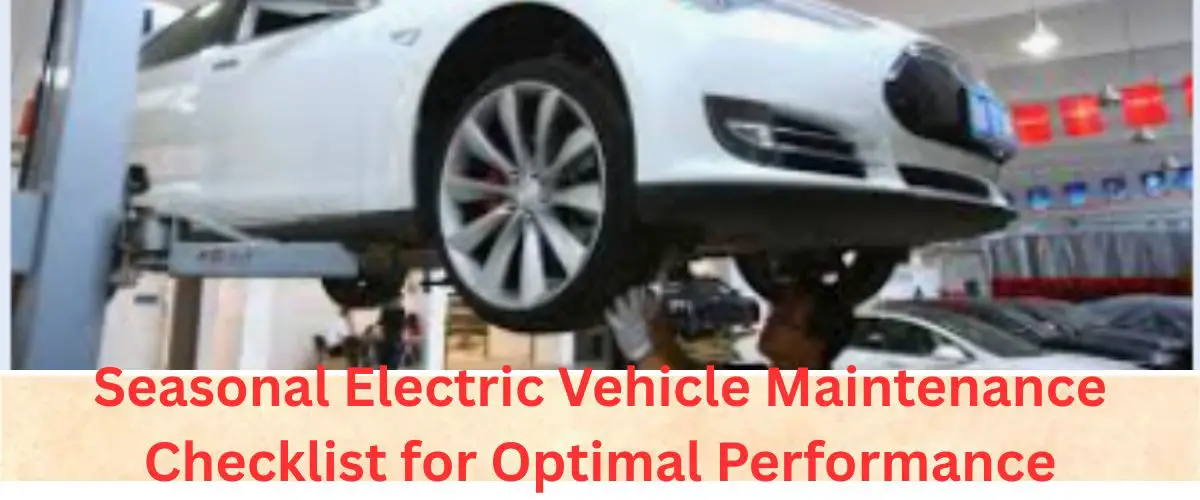Electric vehicles (EVs) are celebrated for their efficiency and reduced maintenance compared to traditional internal combustion engine vehicles. However, to ensure optimal performance and longevity, EVs still require regular maintenance, especially as seasons change. Different weather conditions can impact various components of your EV, from battery efficiency to tire performance. This article provides a detailed seasonal maintenance checklist to help you keep your EV in top condition throughout the year.
Spring Maintenance
1. Battery Health Check
After the cold winter months, it’s essential to assess your EV’s battery health. Cold temperatures can temporarily reduce battery efficiency. Ensure the battery management system (BMS) is functioning correctly and consider a professional diagnostic if you notice any irregularities.
2. Tire Inspection and Rotation
Inspect tires for any damage or uneven wear caused by winter driving conditions. Rotate tires to promote even wear and extend their lifespan. Ensure tire pressure is at the manufacturer’s recommended level, as temperature fluctuations can affect pressure.
3. Brake System Evaluation
While EVs use regenerative braking, the traditional braking system still requires attention. Check brake pads and discs for wear and ensure the brake fluid is at the appropriate level.
Summer Maintenance
1. Cooling System Check
High temperatures can strain your EV’s cooling system. Ensure coolant levels are adequate and that the system is free from leaks. A properly functioning cooling system helps maintain battery health and overall vehicle performance.
2. Air Conditioning System Service
Test the air conditioning system to ensure it’s operating efficiently. Replace cabin air filters if necessary to maintain air quality and system performance.
3. Battery Charging Habits
Avoid charging your battery to 100% regularly during hot months, as this can accelerate degradation. Aim to keep the charge between 20% and 80% for optimal battery health.
Autumn Maintenance
1. Wiper Blade Replacement
Replace windshield wiper blades to prepare for increased rainfall. Ensure the windshield washer fluid reservoir is full and contains a solution suitable for colder temperatures.
2. Lighting System Check
With shorter days, ensure all lights, including headlights, brake lights, and turn signals, are functioning correctly. Replace any burnt-out bulbs promptly.
3. Tire Assessment
Inspect tires for adequate tread depth to handle wet and slippery conditions. Consider switching to all-season or winter tires if you live in an area prone to snow and ice.
Winter Maintenance
1. Battery Performance Monitoring
Cold temperatures can reduce battery efficiency and range. Precondition your EV while it’s still plugged in to warm the battery before driving. This practice helps maintain performance and extends range.
2. Tire Pressure Checks
Regularly check tire pressure, as cold weather can cause it to drop, affecting traction and efficiency. Maintain pressure at recommended levels for safe driving.
3. Brake System Maintenance
Ensure the braking system is responsive, as icy conditions demand optimal brake performance. Have the brake system inspected if you notice any changes in braking behavior.
General Maintenance Tips
- Software Updates: Keep your EV’s software up to date to benefit from the latest features and improvements.
- Charging Equipment Inspection: Regularly inspect home charging equipment for wear or damage.
- Interior Care: Clean and protect interior surfaces to maintain the vehicle’s aesthetic and comfort.
Frequently Asked Questions (FAQ)
Q1: How often should I service my electric vehicle?
A: While EVs require less frequent servicing than traditional vehicles, it’s recommended to follow the manufacturer’s maintenance schedule, typically involving check-ups every 12,000 to 15,000 miles.
Q2: Do I need to change the oil in my EV?
A: Fully electric vehicles do not require oil changes. However, plug-in hybrids (PHEVs) still have internal combustion engines that need regular oil changes.
Q3: Can I use a regular mechanic for EV maintenance?
A: It’s advisable to use mechanics trained in EV maintenance, as they have the necessary knowledge and equipment to service electric vehicles properly.
Conclusion
Regular seasonal maintenance is crucial to ensure your electric vehicle operates efficiently and safely throughout the year. By following this comprehensive checklist, you can address the unique challenges each season presents, prolong your EV’s lifespan, and enjoy a reliable driving experience.

